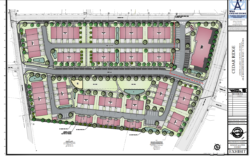The Athens-Clarke County Mayor and Commission is considering a policy called “inclusionary zoning” that would encourage developers to build more affordable housing. This policy, if passed, would change Athens’ zoning code to provide incentives for developers to include some affordable units in new apartment complexes.
Athens wouldn’t be the first city in Georgia to take this approach to keeping rental prices affordable. Cities like Atlanta and Decatur already have inclusionary zoning ordinances that force developers to include 10% or more affordable units in new developments in some areas, such as the Beltline. But since state law prohibits rent control, they may be illegal. The ACC Planning Commission decided to play it safe by proposing an entirely voluntary program for Athens.
If passed by the ACC Commission, Athens’ voluntary inclusionary zoning program will come with some major perks for developers. For example, participating developers would be allowed to build more housing units per acre of land than normally allowed. The density bonus is quite large (50% in most zones), so that could be a big boost for their profit margins.
Another perk of participation is that developers would be allowed to build 20% fewer parking spaces than otherwise required, as long as the new development is within 1,500 feet of an Athens Transit bus stop. Finally, apartment complexes in the downtown area would be allowed to allocate less space on the ground floor to commercial uses than otherwise required.
Developers who don’t want to build affordable housing could still take advantage of these benefits by paying into an affordable housing fund. They’d have to pay between $135,000 and $165,000 for each affordable unit they would have been required to build. The local government would then use the money to construct affordable housing themselves. However, paying into the fund would only be an option for potential developments in the downtown commercial zone as the proposal currently stands.
In exchange, developers would pledge to keep some of the units affordable for at least 20 years, the longest period the commission could legally require. According to the U.S. Department of Housing and Urban Development, “affordable” housing is defined as costing at most 30% of the tenants’ income.
The policy would require that rents in affordable units be kept affordable for those making at most 80% of Athens-Clarke County’s area median income for at least 20 years, or even 60%, depending on how many affordable units are built. In general, the deeper the subsidy developers offer, the fewer affordable units they would be required to build.
Only tenants with income in this range or lower would be allowed to rent the units. The owner of the complex would be responsible for verifying the income of prospective tenants, which would be reassessed yearly to see if they continued to qualify for the program. Owners would not be able to reveal this information to anyone. Also, no discrimination against tenants in the affordable units would be allowed; these units would be identical to and have the same access to amenities as those elsewhere in the complex.
There was broad agreement among commissioners on the inclusionary zoning proposal at their agenda-setting meeting Feb. 15. This proposal also comes unanimously recommended by the ACC Planning Commission, which worked for over a year in coordination with Commissioners Mariah Parker and Tim Denson to craft the proposal. No commissioner spoke in opposition to the plan, and some strongly praised the idea.
“This is a significant step for us to take in terms of addressing affordable housing,” Commissioner Carol Myers said. Mayor Kelly Girtz agreed, saying that “everyone who worked on this deserves a gold medal.”
But that doesn’t mean there wasn’t any disagreement on the finer details of the proposal. Parker, for example, wanted to let developers in any zone pay into the housing fund in lieu of actually constructing the affordable housing themselves, not just those in the downtown zone.
Denson, on the other hand, wanted to keep the responsibility of constructing affordable housing on the shoulders of developers, rather than giving them an option to make payments in lieu of construction.
Whatever the details, Denson said it is important to pass a policy as soon as possible. “Because of how many potential developments are waiting in the wings… we needed to move quickly to get something that was ready to go,” he said, referencing the many apartment buildings being planned for construction in Athens.
In recent years, the commission has been negotiating with every developer on an ad hoc basis to try and get some affordable housing included in new developments. This proposal, if passed, would standardize and streamline those negotiations.
The vote on the inclusionary zoning proposal was scheduled for Mar. 2 but had to be delayed until April because a required legal notice was not printed in time. This error didn’t bother Commissioner Melissa Link, who was grateful for the extra time.
“I feel like we as a body need to have multiple conversations about it and really dig into it. It’s something that’s so important that we all need to give it our full attention,” Link said. “This is work that should have started six, eight or 10 years ago. It’s something I had been begging for under [Mayor Nancy Denson’s] previous administration.”
Heather Benham, executive director of the Athens Land Trust, told the Athens Politics Nerd website that, while she agreed the proposal was “a great first step,” she wanted to see more work being done to make home ownership more affordable as well. The current proposal only affects multi-family developments like apartment complexes. However, Denson said the commission will be expanding its work on affordable housing to include home ownership soon.
A version of this article originally appeared at Athens Politics Nerd.
Like what you just read? Support Flagpole by making a donation today. Every dollar you give helps fund our ongoing mission to provide Athens with quality, independent journalism.










